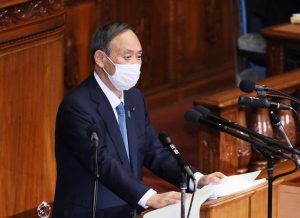Suga Yoshihide, the former prime minister of Japan, could not have imagined his political fortunes turning around within a span of a year, considering his downfall from the highest office in Japanese politics.
When Suga came to office in September 2020, after long-time Prime Minister Abe Shinzo stepped down, he was initially welcomed by the public. Suga enjoyed a high approval rating due to his humble upbringing and love for pancakes, but he was soon engulfed by problems, namely COVID-19. In hindsight, the surge in the number of infections during Suga’s term pales in comparison to case counts under current Prime Minister Kishida Fumio. However, at the time, as a record-breaking number of cases was reported, the public soured on Suga.
His decision to host the Tokyo Olympics during the pandemic only worsened the public perception of him. This was a serious blow for a leader whose support from the public was everything, considering he did not belong to a faction within his party due to his maverick instincts. But back then, the last thing that the public wanted was a potential super-spreader event under a pandemic.
Suga’s personal traits also contributed to his political demise. As Abe’s chief cabinet secretary, a position that he held for eight years before becoming prime minister, Suga was known for being bullish on the bureaucracy, coaxing the institution to achieve government policy. But the downside of his demanding style and emphasis on behind-the-scenes excellence was that he appeared dictatorial and untransparent, which were the criticisms that he often received as prime minister. His reticence also backfired, since successful public messaging was vital for pandemic management, as other government leaders around the world demonstrated.
Ultimately, Suga was ousted in the Liberal Democratic Party’s presidential election in fall 2021, replaced by Kishida just weeks ahead of the general election. However, as the election approached his popularity saw a resurgence. Just as Suga announced that he did not intend to run in the LDP presidential race, the number of infections started to decline, which the public credited to the success of the vaccination rollout under Suga. Thus, as the general election campaign unfolded, he was cheered across the country and courted by candidates to make stump speeches in order to boost their electoral prospects.
As factions sidelined from the center of power felt ostracized from Kishida, the intra-party opposition seemed to rally around Suga. Early last year, Suga and his allies tested the waters of whether to launch a “study group” for the purpose of materializing the policy initiatives that he had spearheaded during his administration. The reports were widely seen as a preliminary step for him to establish his own faction, which will allow him to exert influence over Kishida, even possibly laying the groundwork for another bid for the premiership.
Suga’s attempts to absorb the frustrated elements within the party were paused, however, after the shock of Abe’s assassination and Kishida’s resounding victory in the upper house election.
Yet Suga’s role was still growing in significance. There were rumors that Kishida was considering naming Suga deputy prime minister. While the position is a ceremonial role, the fact that such a possibility had been seriously considered within political circles highlighted the recovery of Suga’s influence. Clearly he is powerful enough for Kishida to consider neutralizing Suga by squeezing him into an irrelevant government post, having stature but no actual institutional power.
Suga has repeatedly stated that he has no intention of seeking another stint as prime minister. However, as scandals and missteps swamp the current administration, his vocal criticisms of Kishida’s governance in recent weeks have some observers questioning those assurances.
During a visit to Vietnam, Suga told reporters that “the voices of the public are not being heard” and criticized Kishida for remaining as the leader of his faction, implying that Kishida appeared to be working for the interest of his faction first, rather than the public interest. A week after that, Suga appeared on a radio program, where he showed discomfort regarding Kishida’s proposal to compensate for the increase in defense spending with tax hikes, which he said “came out of the blue.”
The overt criticism Suga has been aiming toward Kishida rekindled speculation that he is seeking a return to Japan’s top office. Nevertheless, his true intentions remain to be seen. Rather than becoming prime minister again, Suga may seek to become a kingmaker by cementing a base for Digital Minister Kono Taro’s third bid for the LDP presidency. Suga has supported Kono – who has previous experience as foreign minister and defense minister – two times already and is fond of his reformist instincts.
If either scenario actually comes to fruition, Suga’s recovery from the abyss of political power would be recognized as one of the extraordinary comeback stories in Japanese politics.













